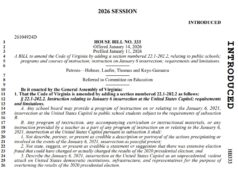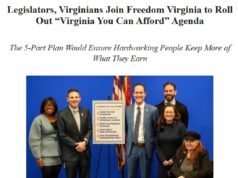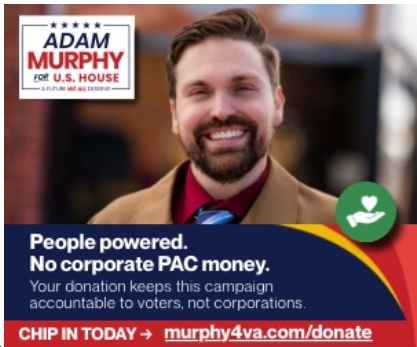by Cindy
I know everyone has a lot going on, and it’s hard to attend every Zoom and every event. But in the aftermath of the murder of George Floyd and Breonna Taylor and the protests that sparked, the Commonwealth is having some incredible conversations about real reforms that we can make to end systemic racism in policing and the criminal system. Here are two that occurred Wednesday night:
The COVID-19 Justice Coalition discussion was moderated by Gin Carter from the Humanization Project. Guest speakers were Delegates Don Scott and Patrick Hope, and Senator Joe Morrissey. While the Senate Democrats recently came out with a strong package of policing and criminal justice reforms they want to advance during the upcoming special session, the House Democrats have only just recently scheduled a set of “listening sessions” and have not broadcast any specific reforms yet.
Delegate Hope explained that the House will have three, three-hour-long, topic-based, formal hearings that include expert testimony plus an hour reserved for public testimony. The hearings will be broadly focused on accreditation in training, body-worn camera policies, civilian police oversight, officer response, demilitarization, and police misconduct accountability. He stated that he agrees with most everything on the Senate Democrats’ list, but that it’s a question of what can be tackled during the special session, and what may need more conversation during the 2021 regular session. Hope said “I believe we missed opportunities in the 2020 session…it was kind of underwhelming on criminal justice reform. Most members on our side recognize that and they want to take action [during the special session].”
Delegate Scott said that during the last session, he didn’t know what to expect when he patroned his earned good time credit bill, but that so many people suddenly showed up to the small committee room it was overflowing and they almost had to cancel the meeting. “People were clamoring for hope and opportunity for their loved ones.” Scott urges people to show up to these hearings and bring their ideas. “What the legislature pays attention to is engagement and money. Engagement can beat money every time if we do it right.”
Senator Morrissey said the single most important issue he wants to focus on during the special session is jury sentencing. He said that the way our system is currently set up, “prosecutors extract draconian plea agreements by threatening a jury trial,” and too many people forego their constitutional right to a jury trial. Reforming or ending jury sentencing would force prosecutors to give plea agreements commensurate with the crime.
The moderators read a selection of questions submitted from people currently incarcerated. One was about the implementation of Governor Northam’s budget amendment that allowed early release for those with less than a year left in their sentence, to minimize prison crowding and COVID-19 health risks. So far, only around 300 people out of the 2000 or so who should be eligible for release. Senator Morrissey said he has personally written over 75 letters to wardens advocating for peoples’ release, on behalf of their families, and has had no luck getting the Virginia Department of Corrections (DOC) to move forward. Delegate Scott said “the bureaucracy and financial incentives to keep people locked up outweigh even a pandemic.”
Another submitted question: “Recently Brian Moran claimed that the whole DOC has only 16 positive cases, but that is without recent testing. At State Farm Enterprise Unit, where about 140 tested positive around June 22nd, they suddenly claim no positive cases in the building on July 2nd, and they’re treating everything as all clear with no further testing… It seems like they want to claim low numbers just to avoid release and transparency.”
Senator Morrissey called 16 positive cases out of a prison population of 28,000 a “statistical improbability–it doesn’t happen.” Delegate Scott said “it has been difficult to get any information that makes sense, even for me as a delegate. I really don’t trust anything they’re saying. I understand the incentives and the financial incentives not to release people.” Delegate Hope said that there would be oversight hearings on behalf of the Public Safety Committee right after special session. “There needs to be some accountability within the DOC. They haven’t had this kind of oversight before. That’s about to change.”
There was some discussion about one particular obstacle to reform—the fiscal impact statements prepared by DOC that accompany any legislation, that are written with a bias towards making the reform seem impossibly expensive, effectively killing the bill. Senator Morrissey said he intends to introduce legislation requiring estimation of the cost savings be included with every bill.
Finally, there was a good conversation about the VCBR (Virginia Center for Behavioral Rehabilitation), where people who have completed their sentence, often serving the full maximum time, are then civilly committed afterwards to a new institution because they MIGHT commit a future crime. (No, really this is an actual thing that happens in Virginia!) The Commonwealth spends $130,000 per person, per year to civilly commit these people. Senator Morrissey said this “violates every notion of due process,” and will introduce legislation in the 2021 session to end this program. The Commonwealth spent $110 million in 2019 to build a brand new VCBR facility. “Imagine if we had dedicated that money to actual rehabilitative services,” he said.
As Senator Morrissey said, though, “policing and prison are two sides of the same coin.” And the policing side of the coin was the subject of the Justice Forward Virginia panel, moderated by Arlington’s chief public defender, Brad Haywood; and featuring Portsmouth Deputy public defender Lakishi Stevenson; Senior public defender for Fairfax County, Bryan Kennedy; and private defense attorney, Shawn Stout.
Haywood explained that while incidents of police brutality have occurred for decades, that this moment is a “flashpoint in history, where something has to change.” He asked “Is all that we’re concerned with police using force when they arrest people, is it just about how gentle police are when they put people in handcuffs or lock them in cages?” Of course not. Tragedies like the murder of George Floyd are “the ultimate symptom of a system that is broken at its foundation.”
So Justice Forward Virginia isn’t focused on policies like banning chokeholds, implicit bias training, community policing, body cameras, setting use of force standards, and de-escalation training, most of which either don’t work to reduce racial bias or are already officially in place most places. Instead they are focused on policies that limit unnecessary police contact. “One way to have fewer people die from interactions with police is to ask them to be gentler. Another way is to keep those contacts from happening to begin with,” Haywood said.
The rest of the discussion was almost like a spitting contest between these defense attorneys telling shameful, jaw-dropping stories of all the excuses police have to stop people—and let’s be clear, wealthy or white people are largely NOT being stopped for any of these reasons, it’s really an excuse they use to stop Black people, Latinos, and low-income people. “This may surprise you, because we have a constitution, but cops CAN pull you over because you’re Black. They just can’t SAY it. They have to come up with a different reason to lie about the real reason they’re doing it.” And once someone is stopped, he or she has to choose between complying with whatever the officer says (including allowing the officer to search their body or car or property) or risking what happened to Philando Castile or Sandra Bland.
Here are some excuses to stop people that were mentioned (although there are many more in the 700 pages worth of traffic infractions that exist in Virginia legal code):
- Defective equipment (including equipment that’s optional to have)
- Dangling objects hanging from rear-view mirror (parking hangtags, air fresheners, etc.)
- “Odor of marijuana” (exempt from 4th Amendment protections from search)
- “High crime, high drug” areas
- Loud exhaust
- Tags not matching car/driver, expired tags, etc.
- Dark tint
- Jaywalking
- Not walking on the left on a street with no sidewalks
- Flicking cigarette ashes out the car window
Here’s what the legislators and these criminal defense experts want you to know: This is a unique moment, where the public is clamoring for reform. Grab it! Make noise! Show up at these House public hearings and anywhere else you can bend your legislators’ ears, and make your voice heard. Demand reform. Don’t settle for half-measures, or studies, or anything less than real reform.












